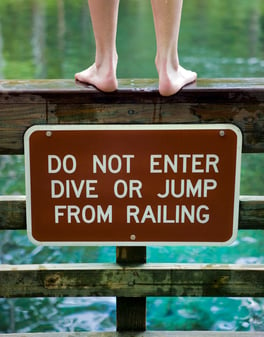Parenting today's teens is challenging. Many parents even dread raising teenagers because they've often heard negative, even scary stories over the years from other parents. As a culture, we think we've got teenagers pegged—uncontrollable, disrespectful, and rebellious. The big question is: "Is adolescent rebellion avoidable?"
Estimated reading time: 5 minutes
The Parent-Teen Connection Is Vital!
If we take a moment to shift cultural expectations and our perspective as parents, we begin to see adolescence differently. When we approach this season of their life and seek to understand a teen's needs while also meeting their developing brains with nurturing responses, a whole new picture presents itself.
The next question we need to be asking then is: "How do we create and sustain a strong teen parent connection all the time they're pushing us away and seeking peer inclusion and approval!?"
It's true, just when our teens need us the most, they focus more on peers. Yet, this tendency does not displace the primary relationship teenagers have with their parents.
True again: emotions run high for teenagers, especially when cornered by an upset parent.
Contrary to what most believe, teens are not naturally rebellious. They are vibrantly alive and need to be understood and supported in ways that positively assist their exploration and development.
As stated in The Teen Years Explained by the Center for Adolescent Health:
"Adolescence is a time of opportunity, not turmoil. Research shows that adolescence—contrary to views that predominate in our media and culture—is actually positive for both teens and adults."
Much of what you observe in your "rebellious teenager" can be understood through the changes that are happening in their brain. These formative years are an intense period of teenage brain development for your budding adult. By learning key parental responses to assist your teen during this critical developmental time, you can smoothly surf the waves of change.
 There are several areas that are important to be aware of. The first is the way your teen relates to experience.
There are several areas that are important to be aware of. The first is the way your teen relates to experience.
Inside the Teenage Brain:
Risk-Taking Is Natural
In an article published in Wired titled, "A Troubling Adaption: The Beautiful Teenage Brain," the exact behaviors that make the teenage years difficult have been found to be critical for our evolution:
"The period’s uniqueness rises from genes and developmental processes that have been selected for over thousands of generations because they play an amplified role during this key transitional period: producing a creature optimally primed to leave a safe home and move into unfamiliar territory.
The move outward from home is the most difficult thing that humans do, as well as the most crucial—not just for individuals but for a species that has shown an unmatched ability to master challenging new environments. In scientific terms, teenagers can be a pain in the ass. But they are quite possibly the most fully, crucially adaptive human beings around."
Understanding Teenage Risk-Taking
It's true that risk-taking is natural and increases during adolescence, which is scary for parents. However, teens take more risks not because they don’t understand the dangers but because they weigh risks differently than adults. Teens value the reward and exhilaration more dramatically than adults.
Therefore, one of the greatest gifts we can give our tweens and teens is loving and firm parenting. Consistency and stability create a safe space to arrive at logical conclusions, such as driving and drinking having life-threatening consequences. When they are in reaction to us as parents, they are not in their rational brain.
The best way to deal with teenage defiance and risky behavior is by being a calm parent and setting firm boundaries with teens.
Teens and parents alike need to learn skills to communicate effectively and it is parents that need to lead the way. Parents want to know how to motivate teens, what to do with their rebellious teens or how to have a close teen-parent connection. The answer to all of these is through a conscious parenting approach.
Related reading: "Keys to Turn Teen Defiance to Healthy Self-Esteem"
Parents' Number One Priority for Teens Is Safety
Most parents will agree that safety is critical. And to keep our teenagers safe, parents need to have influence. If we don't have influence, we lose our best opportunity to keep them safe.
Parental success lies in our ability to maintain a strong connection with our teens.
Even though it might seem counterintuitive, when your teenager is pushing you away or rebelling, they often need connection and love. To accomplish this feat, we must remain calm ourselves—no knee-jerk reactions! Below are some things that will help.
Emotionally Intelligent Ways to Handle Teenage Rebellion and Risk-Taking
Create opportunities for open dialogue.
The more you understand and respect your teen's individuality, the more you will be equipped to respond in helpful ways that increase the likelihood of your influence. Creating opportunities to talk with your teen openly provides a safe place for them to reveal more of themselves, and how they are thinking and drawing conclusions. This information is extremely helpful as a parent. How can we support our teenagers if we don't know them?
Get Curious!
Avoid jumping to conclusions. Replace judgment of your teen's choices, emotions, and behaviors with curiosity. Many times teens have excellent reasons for their actions, even if on the surface, they don't make sense to their parents. One high school boy I spoke with told me that he felt terrible he had lied to his mom but that he was trying to be a good friend. His goal was clear: protect his friend from peer harassment. In the heat of the moment, he hadn't figured out how to stay true to his friend and be honest with his mom. After he realized that both relationships could be honored, we explored ways of handling an inner conflict in the future. Then, on his own, he came clean with his mom and made a heartfelt repair voluntarily.
One high school boy I spoke with told me that he felt terrible he had lied to his mom but that he was trying to be a good friend. His goal was clear: protect his friend from peer harassment. In the heat of the moment, he hadn't figured out how to stay true to his friend and be honest with his mom. After he realized that both relationships could be honored, we explored ways of handling an inner conflict in the future. Then, on his own, he came clean with his mom and made a heartfelt repair voluntarily.
Teen brains are often unable to make these crucial connections in real time due to their brain development. Their frontal cortex, which is developing at a rapid pace during teen years, often thwarts logical thinking. It's up to us as parents to provide a stable and safe space for them to grow in maturity.
A teen's mistakes are opportunities to develop life strategies, clarify their personal values, learn to self-correct and understand their impact on others.
When we are present in a nonjudgmental way for their fluctuating emotions and irrational behavior, we act as their grounding rod. The purpose of a grounding rod is to work as an electricity conductor, to steer danger away from your home. You, as a parent, can help steer your teens away from danger and help them reach better decisions. You can teach them much-needed emotional intelligence.
Take care of yourself as a parent so you can remain calm.
When parents are grounded, they can create an optimal place for teenagers to work through their inner conflicts. If parents are truly present, this connection allows teens to meet challenges more gracefully and arrive at more helpful and beneficial conclusions.
Easier said than done, right? It's tough to remain calm when your teen's choices can be life-threatening. Understandable. So if and when you do get triggered, take time to calm down before responding. Then, you'll be better prepared to cultivate meaningful dialogue and a stronger relationship that will benefit both you and your teenager.
Related reading: "Why Selfie Care Is Vital for Parents"
So is teen rebellion avoidable? Yes, the more effectively a parent responds, the better the results. Teen rebellion is not necessary, nor are unhealthy behaviors when your growing children, tweens, and teens are equipped with the tools to navigate their lives successfully.
Now is a critical time to effectively guide your teenager so they can become a responsible, loving, and free-thinking adult.
For personalized parent coaching and support with your teen, contact us at support@heartmanity.com. Also, check out Heartmanity's parenting classes and resources.









